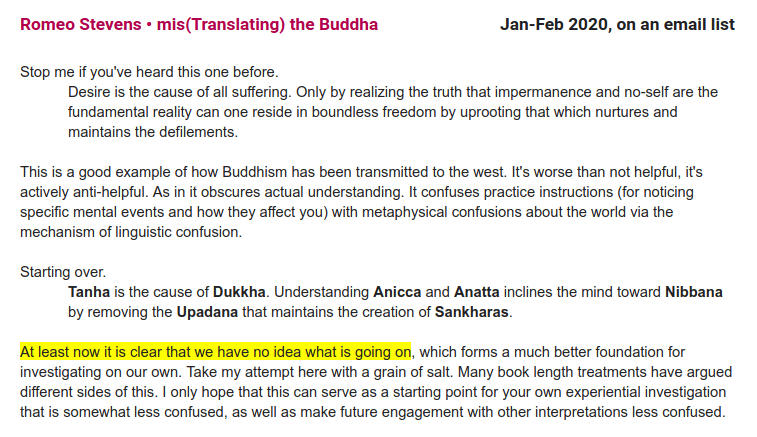🧵 View Thread
🧵 Thread (7 tweets)

🤣🤣🤣 mood. Okay so this actually illustrates something important about "Tanha", the Pali word often translated as "desire" or attachment", in Buddhist contexts, but perhaps better as "grasping". The explosion below is the shattering of a grasped image about a specific person. https://t.co/VBIDtxC8jF

My understanding of Buddhism has been dramatically improved by reading Romeo Stevens' "mis(Translating) the Buddha", which unpacks the meanings of a bunch of these terms and illustrates how confusions have crept into translations over the years. https://t.co/nbyHzlzJhl https://t.co/7yChwXpAEc


In a conversation with @Morphenius today, he speculated that suffering is what occurs when the LH's models are: 1. sealed off from updating 2. don't match reality This seems to be precisely equivalent to "tanha is the cause of dukkha". Tanha very LH: https://t.co/Cdculqqqmx

So, what makes the original tweet funny—I'm going to explain the joke I guess—is that it's told from the big picture plenty-of-fish perspective, whereas the "brain" has clearly tanha'd into in a tiny fishbowl where this news is devastating. https://t.co/VBIDtxC8jF

This experience is ofc hugely familiar, but we usually experience it subjectively from the *small* perspective, because intensity (of devastation) dominates. That experience of suffering is real. It matters. And—it's not all there is, even internally.

According to both McGilchrist's @divided_brain model & most spiritual traditions in one form or another, the big picture is always present too: RHem🧠 awakened mind God It's the 𝙄 𝙖𝙢-ness of it all. It is, by its nature, very hard to point at. https://t.co/maEEeG59dC

Beyond being hard to point at, getting in touch with larger wholeness is also sometimes a challenge because the smallness is clinging to some important perspective it fears will be lost. Eliciting that perspective can help. @byudkowsky has a technique: https://t.co/B59qIzYATM
